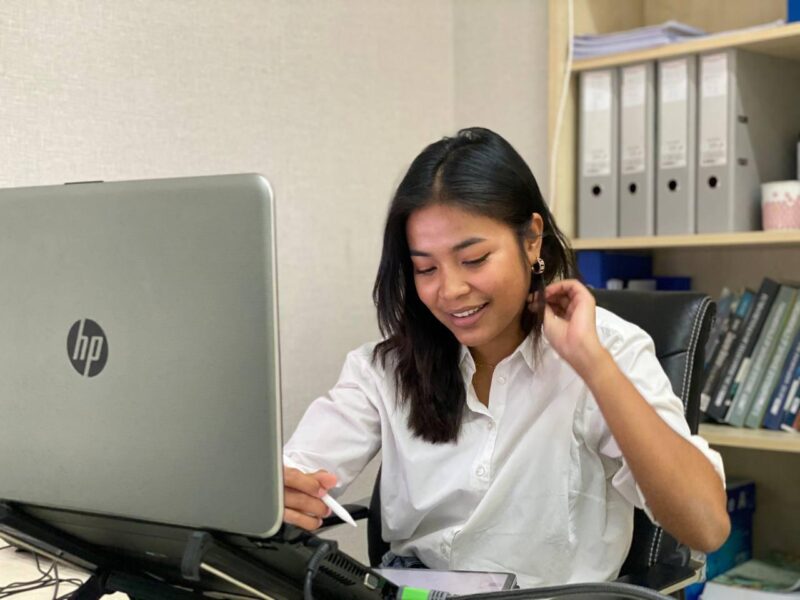Research shows that women anticipate greater difficulty in the world of science in accommodating their professional and family responsibility. Studies carried out in France also revealed that girls who graduate in the “hard” sciences and engineers may experience greater difficulty in finding a job than their male counterparts. This is why it’s important that we share the story of women not only in the particularly masculine world of science, in the industry but also in universities and research institutes.
Let’s hear from Ms. Chansocheata Poum, an instructor and program coordinator of the MIS Department at Paragon International University tells the stories of her personal journey in the fields of science, technology, engineering, and math (STEM).
Career
- Did you have a role model that influenced your decision to work in science?
- Yes! My dad.
- What is your professional background?
- I studied Civil Engineering for my Bachelor’s Degree. I have been working with CAD and architecture since I was in high school to help my dad with his work. When I graduated, I wanted to explore something out of my comfort zone. I worked in technology entrepreneurship sectors in Canada and Cambodia before I went for my graduate study in New Zealand for a Master of Innovation and Commercialisation. I then moved to education working at PIU as Head of the MIS department and also found a startup called Snoopedu. I also found and managed an engineering consulting firm that provided architectural and engineering design solutions.
- Why did you choose this career path?
- The decisions that brought me to where I am today are combinations of answers to several questions such as: “What course am I passionate about?”, “What do I think will solve a systematic problem?”, and “What am I good at and enjoy doing?”
- What is a typical day like for you?
- I woke up early so I could run and have a little “me” time before all the matters of the days consume my mind. Then I go to work, not without a coffee! Every day seems different for me. If I have a lecture on that day, time tends to go much faster. If I don’t, I spend time for meetings, consult students, research, and catch up with the trend for continuous curriculum updates. Afterwork hours and weekends are for the businesses.
- What are the hardest parts related to this work?
- Working at a university, I think it is probably about monitoring and evaluating students’ academic, professional, and self-development that goes beyond the conventional ways such as exams or surveys.
- What (or who) motivated you in difficult times?
- It’s a cliche to say but “MYSELF”. The goals and values that I set for myself.
- During your career, have you been specifically mentored or supported by someone?
- I guess yes. I am inspired by certain people I met and to me that goes even outside the context of mentorship. I think someone does not have to mentor me directly to be supportive. If they are pleasant, open, professional, and authentic in their work, they become a good support system and role model for me.
Personal life
- Do you come from an academic family?
- Yes.
- How does your family regard your career choice?
- I guess they’re pretty pleased? Well, they never say or express anything about this.
- Besides your scientific interests, what are your personal interests?
- My personal interests include Restorative justice, storytelling through a visual medium, drawing comic, well-thought-of coordination of colors and pattern in a space, architecture, gardening,
- Is it hard to manage both career and private life? How do you manage both?
- Yes. I don’t know if I have managed them but I am pretty happy with where I am at. When you do something you love, I don’t think there’s a need to distinguish between career and life. But it is important to factor in rest and time for play.
- If you had the option to give advice to a younger version of yourself, what would that be?
- Don’t stop exploring, playing, and learning.
Women in science
- What were the biggest obstacles you had to overcome? Did you ever have the impression that it would be easier/harder if you were male?
- I don’t take those things to heart but I am sure there were some situations that it was quite unnecessary for me to have to go through because I am female. But adversity also has an upside. They allow me to find my OWN way. I have the impression that it would be much less fabulous if I were male
- What kind of prejudices, if any, did you have to face? How did that make you feel? Were you able to overcome these?
- “Engineering is not for women”, “You’re too beautiful to be an engineer”, “You are too distracted! Just focus on one thing.” (I guess this is how a man works?); “Why don’t you stick to things that you are studying for?” etc.
- They always sting but then I learned through time that it’s not true and the best way to overcome them is to keep doing what I do and don’t give those words any thought.
- In your opinion, which changes, if any, are needed in the scientific system to be more attractive to women in science and possible future scientists?
To make the scientific system to be more attractive to women in science and possible future scientists is through showcasing more female role models to young girls to spark interest at a young age with coding class, competitions, events. At the higher education level, having a support group for female students who are struggling is also vital. The problem here is not that girls will struggle. Both girls and boys will struggle but girls tend to be subjected to toxic stereotypes and believe that they are not made for this during times of difficulties. And we know that’s not true.
Share their story. Add your own and honor their legacy by encouraging young women to pursue a career in science.



